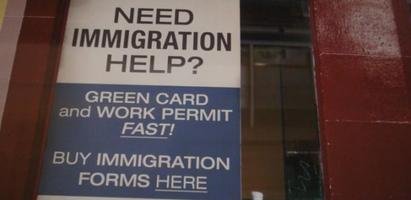In Munoz, SCOTUS held that U.S. citizens do not have a constitutional fundamental liberty interest in their non-citizen spouse’s ability to be admitted to United States, moreover, that U.S. citizens are not constitutionally entitled to review of denied visas as they could not raise this issue indirectly in their spouse’s case.
Ms. Munoz, a U.S. citizen, and her non-citizen spouse of over 10 years, Mr. Munoz, were forced to live apart for several years. Mr. Munoz was denied a visa following several interviews and without any explanation other than a broad reference to section 212(a)(3)(A)Iii) of the Immigration and Nationality Act (INA), which makes an individual inadmissible if the consular officer “knows, or has reasonable ground to believe” that the individual seeks to enter the United States to engage in unlawful activity. Ms. Munoz eventually guessed (correctly) that the Consulate believed her husband was a member of MS-13, a transnational criminal gang, due to his tattoo. Mr. Munoz asked the Consulate to reconsider its visa denial, but the Consulate denied this request. The couple then filed a federal lawsuit against the Consulate and the Department of State (DOS), arguing, inter alia, that the government had abridged Ms. Munoz’s constitutional liberty interest in her husband’s visa application by failing to give a sufficient reason he was inadmissible under the cited INA provision. The District Court granted summary judgment in favor of DOS after DOS admitted the denial was in fact based on a consular officer’s determination that Mr. Munoz had religious tattoos that looked like gang logos. Thereafter, the Ninth Circuit Court of Appeals vacated the judgment, which brought the case next to the U.S. Supreme Court.
In its ruling, SCOTUS indicated that the “’the Due Process Clause specially protects’ only ‘those fundamental rights and liberties which are, objectively, deeply rooted in this Nation’s history and tradition.’” While Munoz invoked the fundamental right to marriage, SCOTUS concluded that Ms. Munoz was in fact claiming something different – the right to reside with her non-citizen spouse in the U.S. And that, SCOTUS concluded, is not a right deeply rooted in the nation’s history. Indeed, the country’s history instead recognizes instead the government’s sovereign authority to set the terms of admission and exclusion. SCOTUS also noted that while Congress has made some specific exceptions for spouses, Congress has not made spousal immigration a matter of right.
In its decision, SCOTUS distinguished an earlier case, Kerry v. Din, 576 U.S. 86 (2015) where in a concurring opinion, Justice Anthony Kennedy assumed that a U.S. citizen would have a liberty interest that would be burdened by a spouse’s visa denial and was therefore entitled to more information than a simple citation explaining the denial. In that case, Justice Kennedy was referring to the fact that a U.S. citizen should have some right to question a denial of a spouse’s visa because there could be “bad faith” denial.
Some advocates are concerned that SCOTUS’ opinion in Munoz could lead to unnecessary family separations and subject U.S. citizen spouses to arbitrary decisions by consular officers, denying them the opportunity to build their lives together with their spouses in the U.S. Moreover, this decision casts fear and uncertainty on non-citizen spouses who have an approved family-based petition who must leave the country temporarily to process their immigrant visas abroad – not knowing whether a consular officer may erroneously deny their visa. Ultimately, SCOTUS’ decision may force U.S. citizen spouses to leave the U.S. so they can live with their spouses abroad – without having had the ability to challenge a potentially erroneous visa denial by a consular officer.
https://www.supremecourt.gov/docket/docketfiles/html/public/23-334.html
https://supreme.justia.com/cases/federal/us/602/23-334/









 RSS Feed
RSS Feed